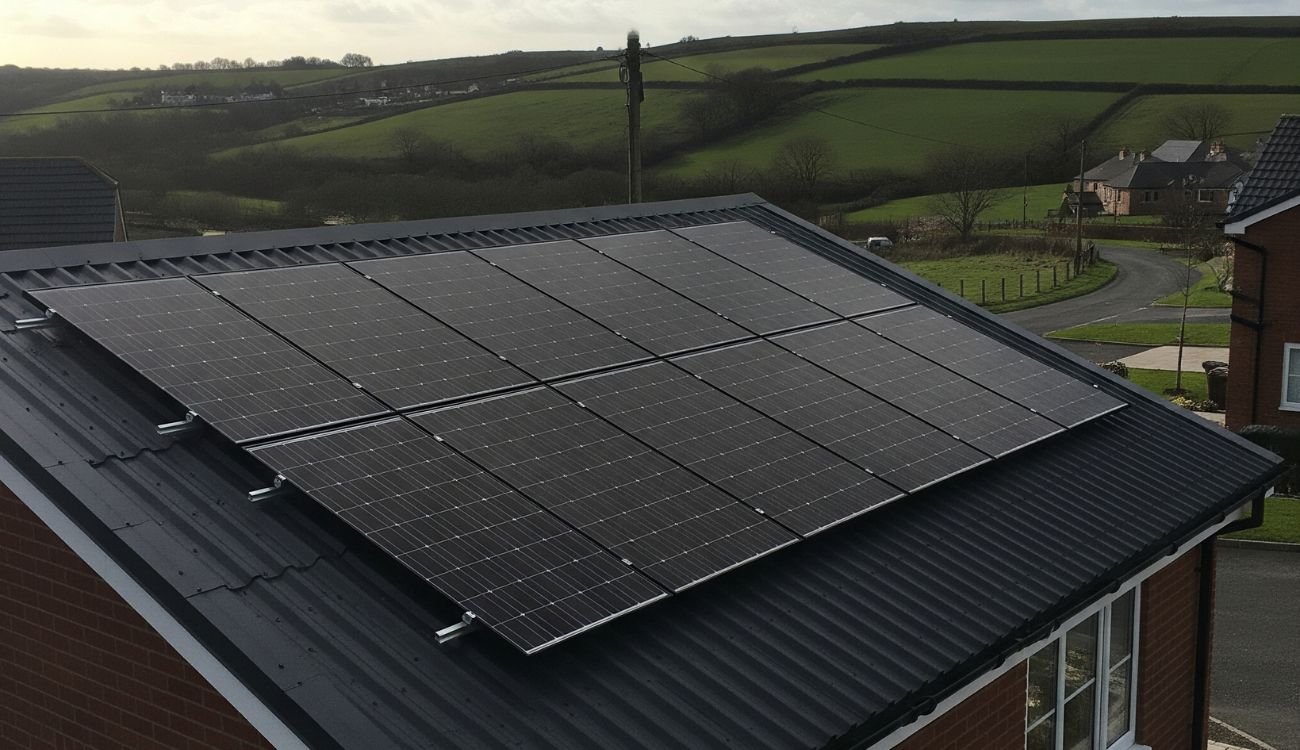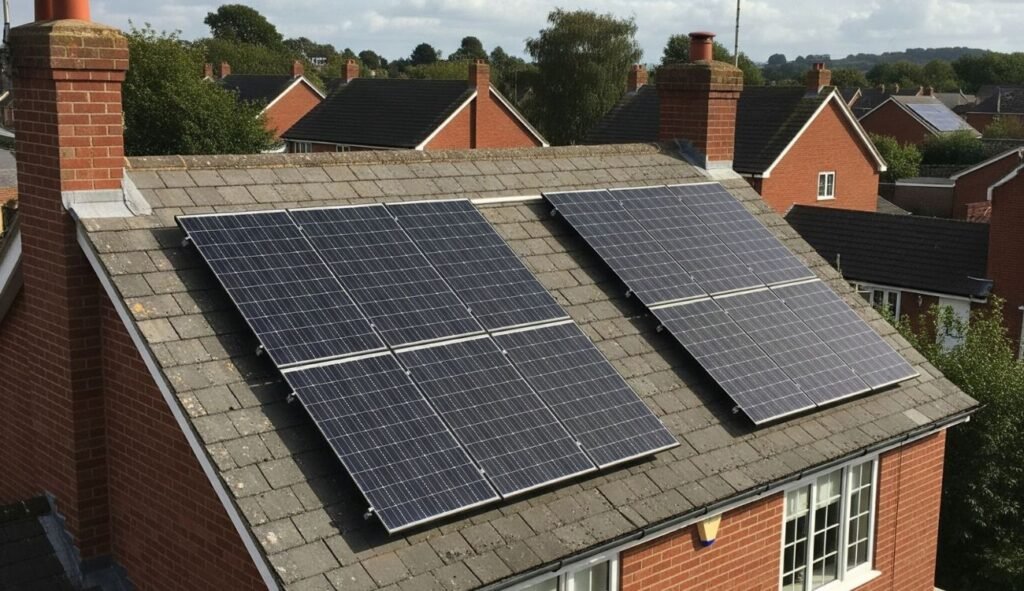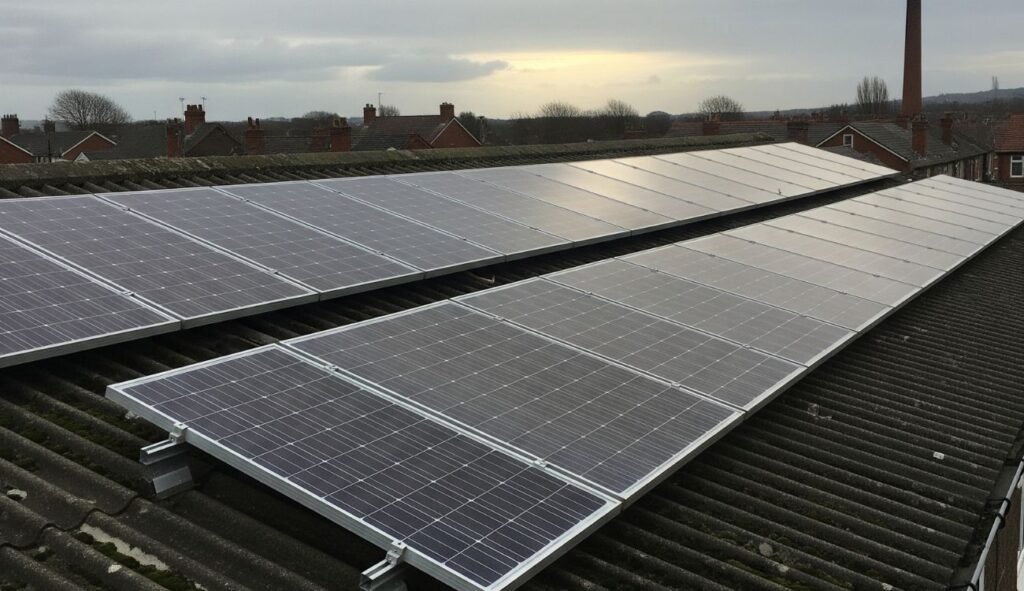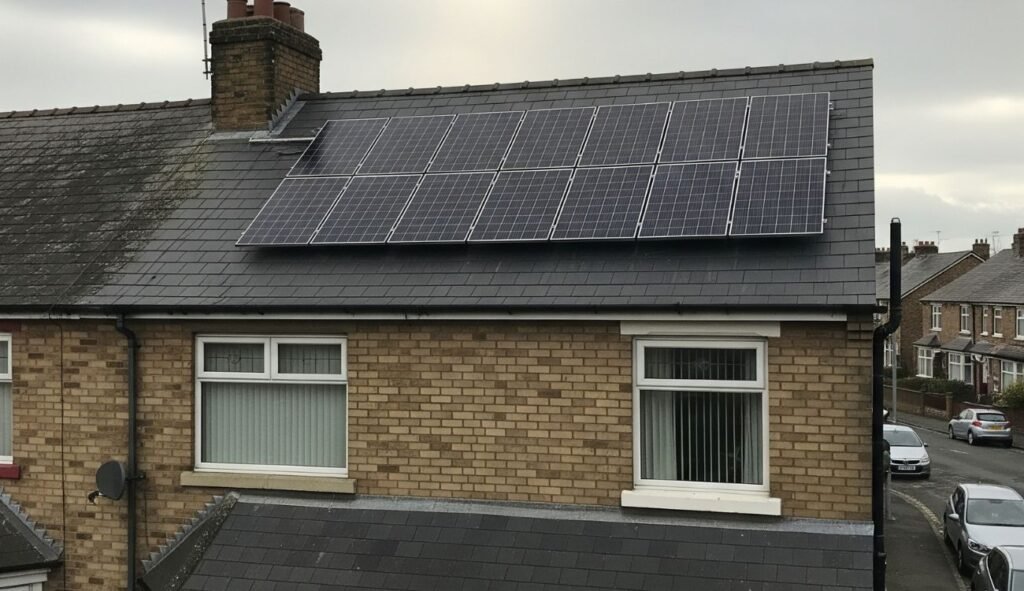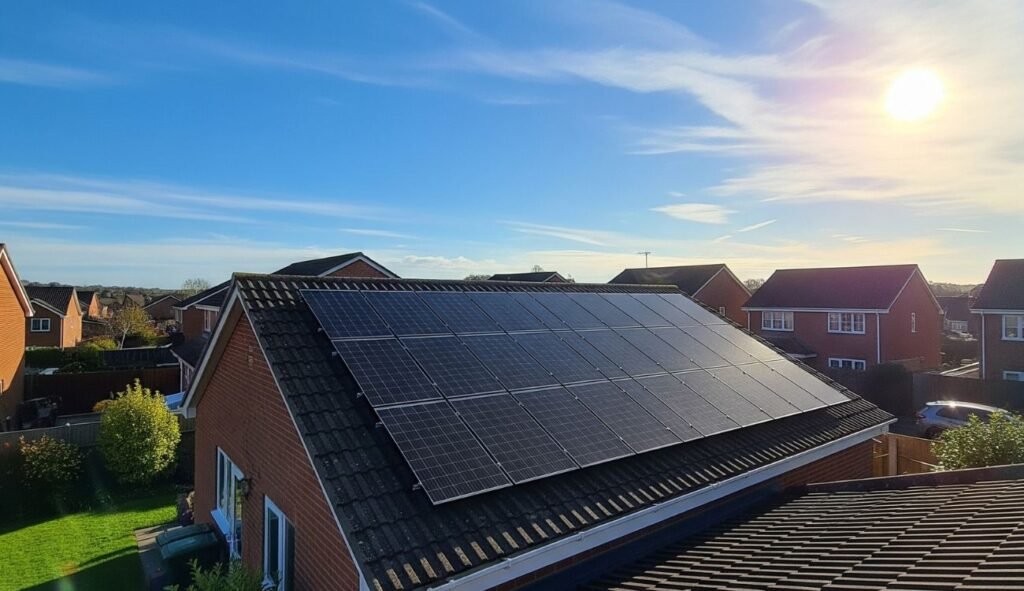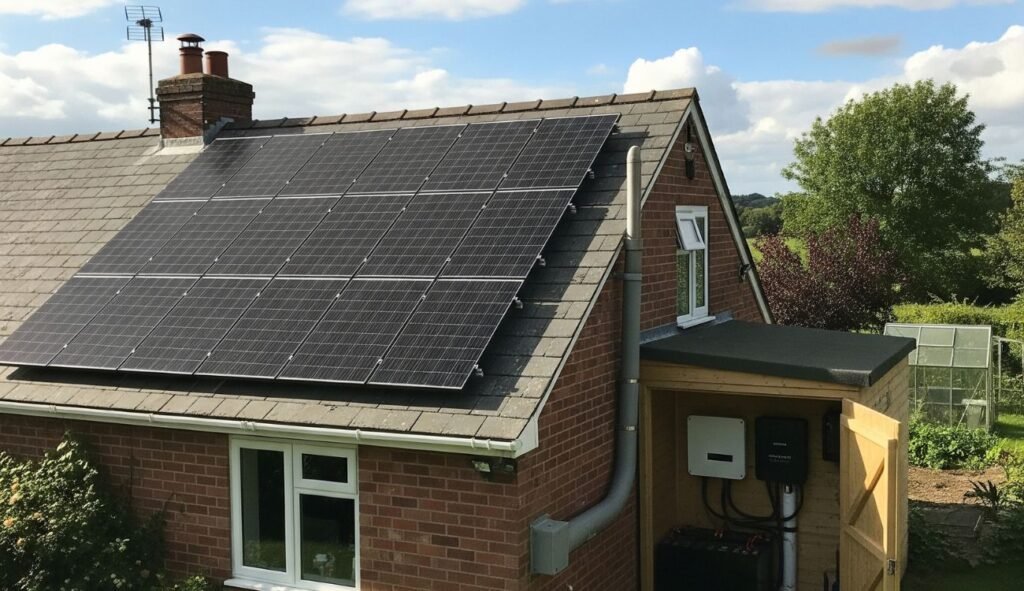Yes, solar panels can be installed on an asbestos roof, but it requires careful planning, strict adherence to UK safety regulations, and the expertise of licensed professionals due to the health risks associated with asbestos.
This blog post will guide you through the feasibility, safety considerations, and alternative options to make an informed decision.
Is It Possible to Install Solar Panels on an Asbestos Roof?
Yes, you can install solar panels on an asbestos roof, but it’s a complex process that demands strict compliance with UK health and safety regulations.
According to the Health and Safety Executive (HSE), asbestos-containing materials (ACMs) like roofing sheets, common in buildings built or refurbished before 2000 pose significant health risks if disturbed.
Drilling or cutting into asbestos can release harmful fibres, which are linked to serious conditions like mesothelioma, as supported by research from institutions such as the University of Manchester on occupational asbestos exposure and lung diseases.
To install solar panels safely, you’ll need:
- Licensed Professionals: Only HSE-licensed contractors should handle asbestos-related work, ensuring compliance with the Control of Asbestos Regulations 2012.
- Specialised Equipment: Tools like shadow vacuuming and wet suppression minimise fibre release during installation.
- Non-Invasive Mounting: Systems like ballasted or clamping mounts avoid penetrating the asbestos, reducing risks.
For North East property owners, particularly in areas like Newcastle and Gateshead with older commercial buildings, working with accredited installers like Future Heat ensures safety and compliance. The process is feasible but requires expertise to avoid health hazards and legal issues.
Why Is Asbestos a Concern for Solar Installation?
Asbestos, once widely used in roofing for its durability and fire resistance, is now heavily regulated in the UK due to its carcinogenic properties.
Experts in renewable energy retrofitting, including guidance from the Health and Safety Executive (HSE), highlight that installing technologies like solar panels on older buildings must account for hazardous materials such as asbestos to ensure worker and public safety. This involves surveys and safe handling protocols before any disturbance.
Disturbing asbestos during solar installation can release fibres into the air, posing risks to installers and residents.
Key concerns include:
- Fragility: Older asbestos roofs, common in rural Northumberland barns or Teesside warehouses, may be brittle and prone to cracking under the weight of solar panels.
- Regulatory Compliance: The HSE mandates strict protocols for handling asbestos, including containment and disposal, to prevent contamination. Non-compliance can lead to fines or legal action, as outlined in GOV.UK’s asbestos guidance.
- Health Risks: Inhalation of asbestos fibres is a significant health hazard, requiring specialised cleanup post-installation.
What Are the Safety Regulations for Installing Solar Panels on Asbestos Roofs?
Installing solar panels on asbestos roofs must comply with the UK’s Control of Asbestos Regulations 2012, enforced by the HSE. These regulations require dutyholders, particularly for non-domestic properties like factories in Middlesbrough or council buildings in South Shields, to identify and manage asbestos before any work begins.
HSE guidance underscores that asbestos regulations are critical for protecting workers and the public, with ongoing efforts to improve compliance through tools like the proposed Asbestos Information Certificate (AIC), which rates dutyholder adherence.
Key regulations include:
- Asbestos Survey: A survey must identify ACMs in buildings constructed or refurbished before 2000, where asbestos is commonly present.
- Licensed Contractors: Only HSE-licensed professionals can handle asbestos-related work.
- Containment Measures: Work areas must use barriers, negative pressure systems, and air filtration to prevent fibre spread.
- Waste Disposal: Waste Disposal: Asbestos waste must be disposed of at licensed facilities, as per HSE and Environment Agency guidelines, which require double-bagging, labeling, and transport to authorized sites to prevent environmental contamination. Non-compliance can result in severe penalties.
How Much Does It Cost to Install Solar Panels on an Asbestos Roof?
The cost of installing solar panels on an asbestos roof varies depending on the approach, roof size, and location.
Industry experts note that solar installations on complex or hazardous roofs, such as those containing asbestos, require additional safety measures like professional surveys and non-penetrative mounting systems, increasing costs by 20-50% compared to standard roofs.
These measures ensure compliance with HSE regulations while enabling safe renewable energy adoption.
Below is a detailed breakdown of the costs associated with different installation methods.
| Installation Method | Cost Range (3.5kW System) | Key Considerations |
|---|---|---|
| Direct Installation | £6,000–£13,000 | Includes specialised mounts and licensed contractors to handle asbestos safely. |
| With Over-Cladding | £10,000–£20,000 | Factors in cladding costs to seal asbestos, ideal for commercial properties. |
| With Roof Replacement | £15,000–£30,000 | Includes asbestos removal and new roofing, suitable for long-term investment. |
| Ground-Mounted Systems | £8,000–£12,000 | Avoids roof-related costs, perfect for rural properties with ample land. |
In areas like Middlesbrough or Hartlepool, where older industrial buildings are common, over-cladding is a popular choice for cost-conscious businesses. Future Heat offers competitive quotes to balance safety and affordability in the North East.
What Are the Benefits of Solar Panels for North East Properties with Asbestos Roofs?
Despite the challenges, solar panels offer significant benefits for North East homeowners, farmers, and businesses, even with asbestos roofs. The Stephenson Institute for Renewable Energy (SIRE) at the University of Liverpool emphasises solar’s role in reducing carbon emissions.
- Energy Savings: A 3.5kW system can save £400–£600 annually on electricity bills, per Energy Saving Trust.
- Sustainability: Solar reduces reliance on fossil fuels, supporting the UK’s net-zero goals, as outlined by the Zero-carbon Energy Research Oxford (ZERO) Institute.
- Property Value: Solar-equipped properties may see increased market appeal.
- Smart Export Guarantee (SEG): Earn payments for excess electricity exported to the grid.
By choosing safe installation methods, North East property owners can harness these benefits without compromising health or compliance.
What Are the Alternatives to Installing Solar Panels on Asbestos Roofs?
Given the risks, many experts recommend alternatives to direct installation on asbestos roofs.
1. Roof Replacement
Replace asbestos with modern materials like corrugated steel or composite roofing, ideal for solar panels.
Cost: £10,000–£20,000 for a typical home in Newcastle or Sunderland, but eliminates asbestos risks permanently.
Benefit: Long-lasting roof (25+ years) aligns with solar panel lifespan.
.
2. Over-Cladding
Add a steel or aluminium layer over the asbestos roof to create a safe mounting surface without disturbing the asbestos.
Cost: £5,000–£15,000, more affordable than full replacement, suitable for commercial properties in Gateshead.
Benefit: Enhances insulation and seals asbestos, per University of Sheffield’s sustainable building research.
3. Ground-Mounted Systems
Install solar panels on the ground, ideal for rural properties in Northumberland with ample land.
Cost: £8,000–£12,000 for a 4kW system.
Benefit: Avoids roof-related risks entirely.
4. Asbestos Encapsulation
Apply a protective coating to seal asbestos fibres, allowing safe installation.
Cost: £2,000–£5,000, depending on roof size.
Benefit: Cost-effective for smaller properties in Durham or Teesside.
Future Heat can assess your property in Tyne and Wear or the wider North East to recommend the best alternative, ensuring compliance and safety. Contact us for a tailored solution.
How Do Solar Panel Installations on Different Roof Types Compare to Asbestos Roofs?
Comparing solar panel installations on various roof types to asbestos roofs is essential for North East homeowners and businesses in areas like Durham, Sunderland, and Newcastle, where diverse roofing materials are common.
Unlike asbestos roofs, which require strict safety protocols due to health risks, other roof types like rubber, flat, concrete, fibreglass, tile, and metal roofs present unique advantages and challenges.
Rubber Roofs
Installing solar panels on rubber roofs, often found on modern extensions or commercial buildings in Gateshead, is generally simpler and safer than on asbestos roofs. Rubber roofs, typically made of EPDM (ethylene propylene diene monomer), are durable, flexible, and non-hazardous, eliminating the need for licensed asbestos contractors.
Flat Roofs
Installing solar panels on flat roofs, common in commercial properties in Middlesbrough or modern homes in Newcastle, is straightforward compared to asbestos roofs.
Flat roofs, often made of bitumen or felt, allow flexible panel placement using ballasted or tilted mounting systems.
Concrete Roofs
Installing solar panels on concrete roofs, found in some industrial buildings in Teesside or council properties in South Shields, is highly feasible compared to asbestos roofs. Concrete roofs are robust and non-hazardous, supporting heavy solar arrays without health concerns.
Fibreglass Roofs
Installing solar panels on fibreglass roofs, often used in conservatories or outbuildings in rural Northumberland, is simpler than on asbestos roofs. Fibreglass is lightweight, non-toxic, and weather-resistant, making it a safe alternative.
Tile Roofs
Installing solar panels on tile roofs, prevalent in residential properties across Durham and Sunderland, is one of the most common and straightforward methods compared to asbestos roofs. Tile roofs, whether clay or concrete, are durable and non-hazardous, supporting standard mounting systems.
Metal Roofs
Installing solar panels on metal roofs, common in agricultural barns in County Durham or industrial units in Hartlepool, is highly efficient compared to asbestos roofs. Metal roofs, often made of steel or aluminium, are durable and non-hazardous, allowing secure mounting.
Frequently Asked Questions (FAQs)
1. Can I install solar panels myself on an asbestos roof?
No, DIY installation is highly dangerous and illegal due to asbestos health risks. Only HSE-licensed professionals should handle asbestos-related work, as mandated by the Control of Asbestos Regulations 2012: GOV.UK Asbestos Regulations.
2. How long does it take to install solar panels on an asbestos roof?
Installation typically takes 2–3 days for a residential system (3.5kW) in areas like Sunderland, but may take longer (5–7 days) for commercial properties in Gateshead due to additional safety measures.
3. Do I need planning permission for solar panels on an asbestos roof?
Usually, no, as solar panels fall under permitted development rights in the UK. However, listed buildings or properties in conservation areas in Durham or Newcastle may require approval, per the Planning Portal: Planning Portal Solar Regulations.
4. Can I get government grants for asbestos removal before solar installation?
Some local councils in the North East offer grants for energy efficiency upgrades, which may cover asbestos removal. Check with your local authority in Tyne and Wear or Northumberland for available schemes.
5. How often should I maintain solar panels on an asbestos roof?
Panels require cleaning every 1–2 years or as needed, depending on local conditions, but maintenance on asbestos roofs must be done by licensed professionals to avoid disturbing the material, ensuring safety and longevity.
Our Verdict
Installing solar panels on an asbestos roof in the North East of England is a viable but complex option that requires careful planning, licensed professionals, and adherence to strict safety regulations.
By exploring alternatives like over-cladding, roof replacement, or ground-mounted systems, homeowners in Durham, farmers in Northumberland, and businesses in Middlesbrough can safely embrace solar energy.
These solutions not only ensure compliance with HSE guidelines but also deliver long-term energy savings and environmental benefits.
For expert guidance and tailored solar solutions, contact Future Heat to request a free quote and start your journey towards sustainable energy in Tyne and Wear and beyond.
Jamie Maguire is Managing Director at Future Heat Ltd, the UK-based renewable energy company specialising in heat pumps, solar panels and energy-efficient boiler solutions. He leads the company’s strategic vision to decarbonise homes and businesses across the UK by delivering innovative, sustainable heating and power systems. Jamie is passionate about shaping the future of energy, supporting communities and empowering teams of skilled engineers to deliver lasting value and carbon reductions nationwide.

